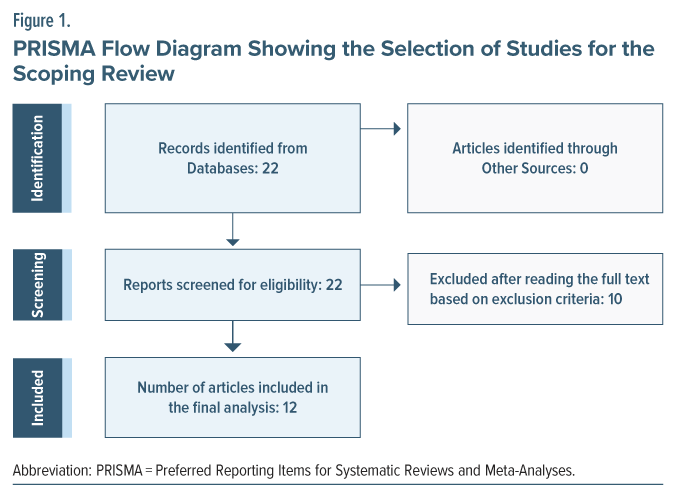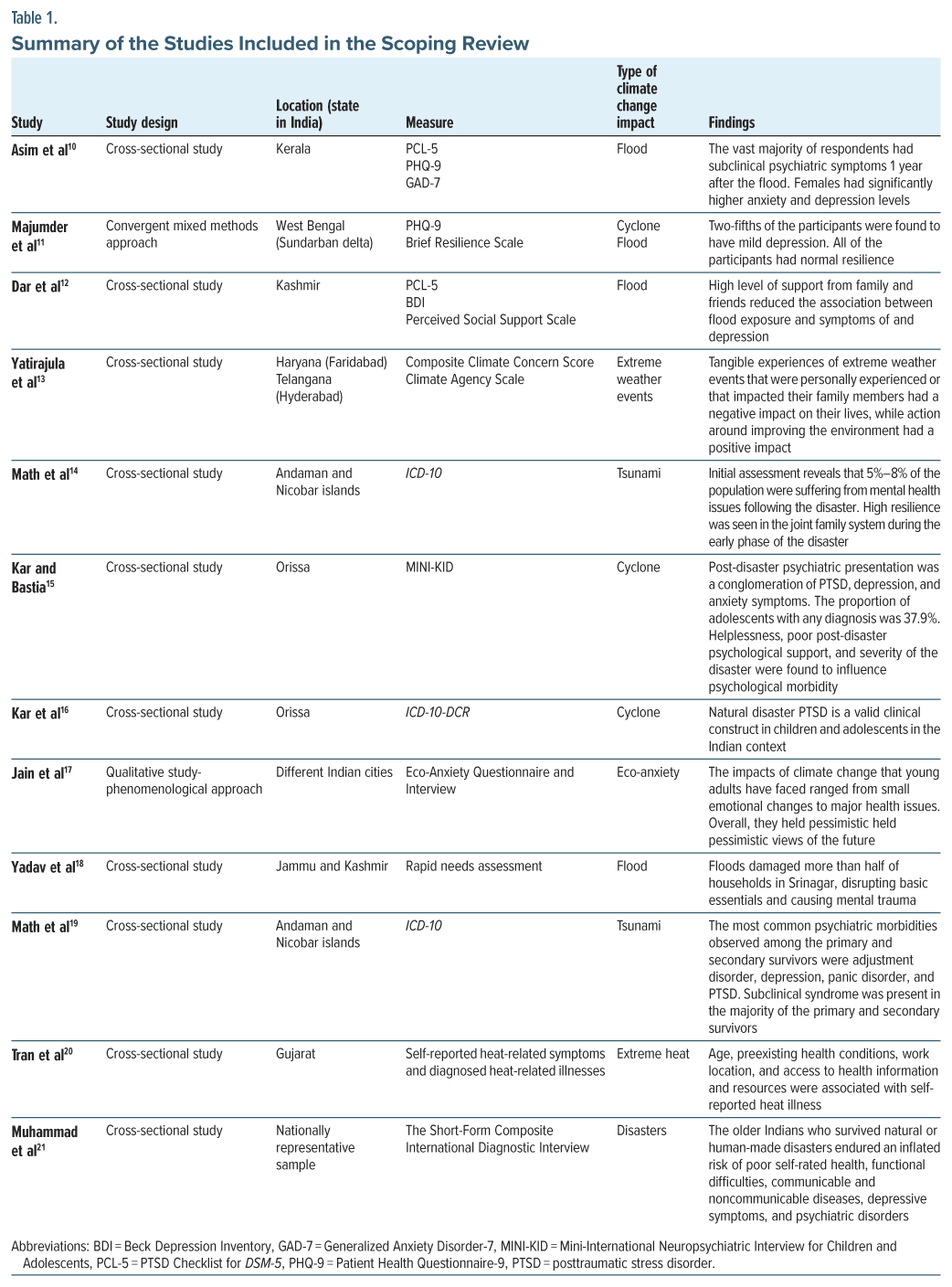Abstract
Objective: To provide an overview of the existing Indian literature exploring the mental impact of climate change and enhance efforts to protect human health from climate-related challenges.
Data Sources: The literature search was primarily conducted in PubMed using the keywords “climate change” AND “mental health” AND “India,” “eco-anxiety” AND “climate change” AND “India,” and “vulnerable populations” AND “climate change” AND “mental health” AND “India.” The literature search was conducted on October 10, 2024. The search included studies published in English with no historical time restrictions.
Study Selection: A total of 12 studies were reviewed, comprising original research and review articles. Inclusion criteria encompassed Indian studies investigating the mental health impact of climate change and related events.
Data Extraction: Data abstraction followed predefined guidelines, focusing on the mental health impact of climate change in India.
Data Synthesis: Findings revealed the intricate relationship between mental health and climate change in India. Three key themes emerged from the analysis of the selected articles: the psychological impacts of climate change, the effects on children and youth, and the role of socioeconomic status in climate-related mental health.
Conclusions: This scoping review highlights the significant impact of climate change on mental health in India, particularly among individuals from lower socioeconomic backgrounds in rural areas. Education was identified as a crucial factor in equipping individuals to cope with these challenges, as those with higher education levels tend to be better prepared to manage the climate crisis. The findings also emphasize the need for clearer definitions and theoretical development regarding climate anxiety. Further research is essential to address these issues and guide the development of effective programs and policies aimed at mitigating the mental health effects of climate change.
Prim Care Companion CNS Disord 2025;27(4):24r03903
Author affiliations are listed at the end of this article.
Climate change represents a critical public health challenge, particularly for India, which possesses a diverse and vulnerable landscape susceptible to various climate-related events, including floods, cyclones, droughts, heat waves, and cold waves. As a result, India stands at the forefront of the global climate crisis, experiencing significant environmental and health impacts from these increasingly frequent and severe climate events.1
Climate change poses a significant threat to mental health and overall well-being. According to the World Health Organization, nearly 1 billion individuals globally are living with mental health conditions. The effects of climate change on mental health are not uniform and vary depending on several factors, including socioeconomic status, gender, and age. Vulnerable populations, such as those with lower socioeconomic resources or individuals from marginalized communities, may experience more severe mental health impacts as a result of climate related stressors.2,3
The climate crisis is anticipated to affect individuals in numerous ways, heightening population vulnerability and leading to a range of psychological consequences, including stress, anxiety, depression, and sleep disturbances.4,5 Moreover, the impact of the climate crisis is particularly pronounced in developing countries such as India. Numerous studies have indicated a correlation between rising temperatures and aggressive behavior, with evidence suggesting an increase in criminal activity during the hot summer months.6,7
Beyond their psychological effects, environmental changes give rise to numerous health issues, including deteriorating air quality, food-borne illnesses, vector borne diseases, and water-borne illnesses. These factors can significantly increase mortality rates, particularly among vulnerable populations.8 This underscores the urgent need for effective climate change mitigation and adaptation strategies aimed at safeguarding public health.
Understanding the relationship between climate change and mental health in India is critical for developing new strategies and interventions. This review aims to provide an overview of the existing literature, identify the impacts of climate change, and enhance efforts to protect human health from climate-related challenges. By assessing the current state of research, this review seeks to deepen the understanding of the mental health difficulties faced by individuals in India.
METHODS
This study employed a scoping review methodology to systematically identify and examine the existing literature on the impact of climate change on mental health in India. The review process followed the guidelines outlined in the Preferred Reporting Items for Systematic Reviews and Meta-Analyses (PRISMA) framework.9
Literature Search
This scoping review employed specific inclusion and exclusion criteria for the selection process. The literature search was conducted on October 10, 2024, primarily using PubMed as the electronic database. The search included published studies with no historical time restrictions, ensuring a comprehensive review of all relevant literature available up to the search date.
Electronic Database Search
A comprehensive literature search was conducted using PubMed to identify relevant studies. The search incorporated the following keywords: “climate change” AND “mental health” AND “India,” “eco-anxiety” AND “climate change” AND “India,” “vulnerable populations” AND “climate change” AND “mental health” AND “India.”
Data Extraction and Quality Assessment
A total of 22 articles were identified through the literature search. Articles were evaluated for relevance, appropriateness, and clarity. Figure 1 provides the PRISMA flowchart.
RESULTS
The final analysis included 12 articles that addressed the intricate relationship between mental health and climate change in India. The study examined various psychological effects, including posttraumatic stress disorder (PTSD), depression, and anxiety. Three key themes emerged from the analysis of the selected articles: the psychological impacts of climate change, the effects on children and youth, and the role of socioeconomic status in climate-related mental health. A summary of the studies is provided in Table 1.
Psychological Effects of Climate Change
In recent years, the psychological impacts of climate change have emerged as a significant public health concern. These effects are associated with various mental health conditions, including anxiety, stress, depression, and PTSD.
Eco-anxiety, depression, and suicidal ideation. Eco anxiety, characterized as a chronic fear of environmental catastrophe, has emerged as a significant concern, particularly in developing countries like India. Researchers have pointed out that climate change–related phenomena exacerbate mental health challenges, contributing to heightened levels of anxiety, depression, and distress.10,11 However, one such study noted depression and anxiety disorders are among the most frequently reported mental health conditions associated with the climate crisis.12 Similarly, 4 studies have indicated that climate-related stress can contribute to suicidal ideation. The impact of climate change has been linked to a concerning rise in suicide rates, particularly among rural populations.10,11,13,14
PTSD. Five studies opined that prolonged exposure to natural or man-made disasters, such as cyclones, terrorism, earthquakes, violence, floods, and droughts, can trigger PTSD in individuals.10,12,14–16 The adverse effects of such disasters are not only limited to the direct victims but also extend to their relatives, rescuers, and disaster response workers.10,14 Additionally, studies have indicated that children and adolescents are particularly vulnerable to PTSD due to their limited access to mental health services. Furthermore, inadequate social and family support exacerbates the risk of prolonged PTSD in this population.12,14–16
Chronic stress and trauma. Five studies have indicated that individuals residing in regions frequently affected by climate-related disasters, such as floods, air pollution, cyclones, and earthquakes, experience traumatic events that may manifest as anger, powerlessness, guilt, stress, depression, and anxiety.10,11,15,17–19 Unemployment, property loss, and crop failure resulting from disasters contribute to increased emotional trauma among affected individuals. Climate change induces widespread community displacement, marginalization, and relocation, all of which significantly impact mental health. Moreover, these individuals often struggle to adapt to new environments, exacerbating their mental distress.10,11,17–19 Furthermore, age, preexisting health conditions, work location, and access to health information and resources were associated with self-reported heat-related illnesses that predispose individuals to psychological morbidities.20
Impact Among Children and Youth
Researchers have expressed considerable concern that younger generations, particularly children and adolescents, are increasingly affected by PTSD due to exposure to natural disasters such as floods, cyclones, and rising sea levels.15,16 This issue is especially pronounced in developing countries like India, where the frequency and severity of these events are on the rise.15 Similarly, children and adolescents encounter considerable challenges in coping with the mental health impacts of climate change, as they are particularly vulnerable to the effects of natural disasters on their physical, mental, and developmental well-being.15–17
Additionally, 3 studies have underscored the necessity for stricter environmental regulations, asserting that such measures could alleviate the prevalence and impact of eco-anxiety among children.11,16,17 Studies reported that 1 in 2 adolescents aged 15–19 years experience an anxiety disorder, and traumatic experiences during early childhood, adolescence, or even infancy can result in enduring behavioral, mental, and physiological impairments.11,16
Socioeconomic Status and Climate-Related Mental Health
Five studies noted that the impact of the climate crisis on mental health in India is significantly influenced by socioeconomic status.10,14–16,21 Individuals residing in rural areas, particularly those living below the poverty line or with low socioeconomic status, are more susceptible to mental distress resulting from climate related events.14,15 Additionally, anxiety levels are generally higher among the unemployed compared to the employed. Furthermore, individuals with higher education are often better equipped to understand the climate crisis, leading to disparities in the levels of climate-related mental distress experienced by different educational groups.10 Finally, individuals from disadvantaged socioeconomic groups are more vulnerable, facing challenges in accessing health care, adequate housing, and essential information. Moreover, those with lower educational levels often struggle to understand climate-related issues, which further exacerbates their vulnerability.16,21
DISCUSSION
This scoping review critically examined the published literature on the impact of climate change on mental health in India, revealing a notable scarcity of studies compared to other countries like the United States, where over a hundred relevant studies have been published. In contrast, international research, such as a recent study in Germany, has explored the psychological effects of climate change, defining climate anxiety as a “chronic fear of environmental doom” that contributes to heightened fear, anxiety, and stress among individuals.22 However, the concept of climate anxiety remains poorly defined in the literature, with various terminologies used across studies.23,24 This review highlights that climate change exacerbates mental health challenges by instilling a “chronic fear of environmental catastrophe,” underscoring the need for more comprehensive research in this area.
This scoping review reveals a shifting focus in studies related to climate change issues in India from 2006 to 2024. Initially, research concentrated on the psychological impacts of climate-induced disasters, such as cyclones and floods.15,16,20 More recent studies have expanded to explore climate-related constructs, including eco-anxiety and heat vulnerability.13,17,20 Despite this progress, a significant knowledge gap persists regarding the intersection of climate change and mental health in India, largely due to the country’s vastness and diversity.
This scoping review highlighted that younger generations, particularly children and adolescents, are experiencing developmental challenges as a result of the climate crisis. Environmental disasters such as floods, cyclones, heatwaves, and landslides disrupt mental health, often leading to PTSD and other psychological conditions. Similarly, existing studies have shown that young individuals are especially vulnerable to these psychological impacts. Furthermore, prolonged exposure to these stressors can alter brain structure, potentially contributing to the development of psychopathologies later in life.25 However, another author reported several coping strategies among children and adolescents associated with climate change such as de-emphasizing the seriousness of climate change, distancing, hyperactivation, positive reappraisal, trust in different societal actors, problem-focused coping, and existential hope.26 Likewise, concerns have been raised regarding substance abuse as a significant issue among individuals with PTSD. Research indicates that those suffering from PTSD may turn to substance use as a coping mechanism, exacerbating both their psychological distress and the risk of developing substance dependence.27
Multiple studies have been conducted in other countries, including the United States, where the psychological effects of climate change have been similarly identified. However, these studies often focus on different geographical regions based on the severity of climate-related crises. In the United States, research tends to be concentrated in urban areas or regions directly affected by climate disasters.28 In contrast, research in India tends to focus on rural areas. Indian states from the north including Rajasthan, Odisha, Uttar Pradesh, and West Bengal and southern states like Kerala, Tamil Nadu, and Karnataka are frequently exposed to climate-related disasters.1
This scoping review also identified several factors that influence the impact of climate change on mental health, including gender, age, preexisting health conditions, work location, access to health information, prolonged periods of helplessness, inadequate postdisaster psychological support, disaster severity, resilience, family systems, environmental improvement efforts, and support from family and friends. Additionally, certain populations are particularly vulnerable to the mental health impacts of climate change, such as the elderly, homeless individuals, and those with chronic illnesses. These groups often face heightened risks due to increased exposure to climate-related stressors and limited access to resources and support systems. Studies revealed that climate change impacts were more pronounced among individuals from lower socioeconomic backgrounds, particularly those in rural areas. Previous research has consistently shown that financial instability is strongly linked to increased mental distress. Individuals affected by disasters often face severe economic constraints, which can exacerbate psychological conditions such as suicidality, PTSD, depression, and anxiety. Providing economic support and access to essential resources has been shown to mitigate these psychological effects, highlighting the importance of integrating disaster recovery with mental health interventions.27 Additionally, the level of education plays a crucial role in mitigating the impact of climate change, as individuals with lower educational attainment often struggle with effective coping strategies in response to climate-related challenges. Our findings are supported by other studies indicating that individuals with higher levels of education are more likely to utilize social resources effectively, thereby reducing the incidence of climate-related mental health issues.29,30 However, the depth of analysis on many of these specific vulnerable populations was limited by the availability of studies focusing on these aspects. Future research should prioritize exploring these factors in greater detail to better understand and address the mental health challenges posed by climate change.
This review also revealed regional variations in the focus areas of climate change studies in India, despite the overall scarcity of research. Notably, studies examining heat vulnerability–related constructs were predominantly located in the northern part of the country.20 In contrast, other studies focused on regions more susceptible to disasters, such as coastal areas in southern India and flood-prone regions in the east.15,16,19 However, the limited number of studies hindered our ability to draw comprehensive conclusions about these regional differences. Further research is warranted to fully investigate these geographic disparities and their implications for the impact of climate change on mental health across diverse regions of India.
Limitations of the Study
The study’s limitations include its reliance on PubMed as the sole database for the literature search, which may have led to the exclusion of relevant studies available in other databases. This restriction could limit the comprehensiveness of the review and may hinder the ability to capture recent developments or evolving perspectives in the field.
Future Directions
Future research should further explore the relationship between climate change and mental health in India, with a focus on vulnerable populations such as children, adolescents, and low socioeconomic groups who are disproportionately affected by the psychological impacts of the climate crisis. Additionally, the development and implementation of new interventions, such as community-based mental health support and public awareness programs, are crucial in identifying and addressing the mental health challenges arising from climate-related events.
CONCLUSION
This scoping review revealed a significant relationship between climate change and psychological effects in India. The findings indicate that individuals from lower socioeconomic backgrounds, particularly those living in rural areas, are disproportionately affected by the mental health consequences of climate change. Financial instability, exacerbated by climate-related events, further intensifies psychological distress. Education emerged as a critical factor in mitigating these effects, as individuals with higher education levels are often better prepared to understand and cope with the climate crisis. The review underscores the need for greater clarity and theoretical development of the concept of climate anxiety. Additional research is necessary to address these challenges and inform the creation of effective programs and policies to mitigate the mental health impacts of climate change.
Article Information
Published Online: July 24, 2025. https://doi.org/10.4088/PCC.24r03903
© 2025 Physicians Postgraduate Press, Inc.
Submitted: December 11, 2024; accepted April 8, 2025.
To Cite: Mangalamchery V, Uvais NA. Climate change and mental health: a scoping review of Indian studies. Prim Care Companion CNS Disord 2025;27(4):24r03903.
Author Affiliations: Department of Psychiatry, Iqraa International Hospital and Research Centre, Calicut, Kerala (Mangalamchery and Uvais).
Corresponding Author: N. A. Uvais, MBBS, DPM, Department of Psychiatry, Iqraa International Hospital and Research Centre, Calicut, Kerala, India ([email protected]).
Relevant Financial Relationships: None.
Funding/Support: None.
Clinical Points
- Climate change significantly affects mental health in India, particularly among those from lower socioeconomic backgrounds.
- Children and adolescents are highly vulnerable to the mental health impacts of climate change.
- Higher education levels enhance individuals’ ability to cope with climate-related mental health challenges.
References (30)

- Gupta AK, Chopde S, Nair SS, et al. Mapping Climatic and Biological Disasters in India: Study of Spatial and Temporal Patterns and Lessons for Strengthening Resilience. India: Deutsche Gesellschaft für Internationale Zusammenarbeit (GIZ) GmbH; 2021:160.
- Why mental health is a priority for action on climate change [Internet]. 2021. https://www.who.int/news/item/03-06-2022-why-mental-health-is-a-priority-foraction-on-climate-change
- Charlson F, Ali S, Benmarhnia T, et al. Climate change and mental health: a scoping review. Int J Environ Res Public Health. 2021;18(9):4486. PubMed CrossRef
- Middleton J, Cunsolo A, Jones-Bitton A, et al. Indigenous mental health in a changing climate: a systematic scoping review of the global literature. Environ Res Lett. 2020;15(5):053001. CrossRef
- Swim J, Clayton S, Doherty T, et al. Psychology and Global Climate Change: Addressing A Multi-Faceted Phenomenon and Set of Challenges. A report by the American Psychological Association’s Task Force on the Interface Between Psychology and Global Climate Change [Internet]; 2009. Accessed April 30, 2025. p. 241–250. https://www.apa.org/science/about/publications/climate-change.pdf
- Padhy S, Sarkar S, Panigrahi M, et al. Mental health effects of climate change. Indian J Occup Environ Med. 2015;19(1):3–7. PubMed CrossRef
- Crimmins A, Balbus J, Gamble JL, eds, et al. The Impacts of Climate Change on Human Health in the United States: A Scientific Assessment. U.S. Global Change Research Program; 2016:312–p.
- Mousavi A, Ardalan A, Takian A, et al. Climate change and health in Iran: a narrative review. J Environ Health Sci Eng. 2020;18(1):367–378. PubMed CrossRef
- Page MJ, McKenzie JE, Bossuyt PM, et al. The PRISMA 2020 statement: an updated guideline for reporting systematic reviews. BMJ. 2021;372:n71. PubMed CrossRef
- Asim M, Sathian B, Van Teijlingen E, et al. A survey of post-traumatic stress disorder, anxiety and depression among flood affected populations in Kerala, India. J Epidemiol. 2022;12(2):1203–1214. PubMed CrossRef
- Majumder J, Saha I, Saha A, et al. Climate change, disasters, and mental health of adolescents in India. Indian J Psychol Med. 2023;45(3):289–291. PubMed CrossRef
- Dar KA, Iqbal N, Prakash A, et al. PTSD and depression in adult survivors of flood fury in Kashmir: the payoffs of social support. Psychiatry Res. 2018;261:449–455. PubMed CrossRef
- Yatirajula SK, Prashad L, Daniel M, et al. A cross-sectional survey of climate and COVID-19 crises in young people in Indian slums: context, psychological responses, and agency. Lancet Reg Health Southeast Asia. 2023;13:100191. PubMed CrossRef
- Math SB, Girimaji SC, Benegal V, et al. Tsunami: psychosocial aspects of Andaman and Nicobar islands. Assessments and intervention in the early phase. Int Rev Psychiatry. 2006;18(3):233–239. PubMed CrossRef
- Kar N, Bastia B. Post-traumatic stress disorder, depression and generalised anxiety disorder in adolescents after a natural disaster: a study of comorbidity. Clin Pract Epidemiol Ment Health. 2006;2(1):17. PubMed CrossRef
- Kar N, Mohapatra PK, Nayak KC, et al. Post-traumatic stress disorder in children and adolescents one year after a super-cyclone in Orissa, India: exploring cross cultural validity and vulnerability factors. BMC Psychiatry. 2007;7(1):8. PubMed CrossRef
- Jain V, Jose A, Nj E, et al. Exploring eco-anxiety and eco-coping in young adults in India. Int J Indian Psychol. 2024;12(3):3329–43.
- Yadav R, Somashekar D, Sodha SV, et al. Post-flood rapid needs assessment in Srinagar City, Jammu and Kashmir State, India September 2014. Disaster Med Public Health Prep. 2019;13(2):133–137. PubMed CrossRef
- Math SB, John JP, Girimaji SC, et al. Comparative study of psychiatric morbidity among the displaced and non-displaced populations in the Andaman and Nicobar Islands following the tsunami. Prehosp Disaster Med. 2008;23(1):29–35. PubMed CrossRef
- Tran KV, Azhar GS, Nair R, et al. A cross-sectional, randomized cluster sample survey of household vulnerability to extreme heat among slum dwellers in Ahmedabad, India. Int J Environ Res Public Health. 2013;10(6):2515–2543. PubMed CrossRef
- Muhammad T, Pai M, Maurya C, et al. Natural and human-made disaster and associated health outcomes among community-dwelling older adults in India: findings from LASI, 2017–18. In: Lee DC, ed. PLoS One. 2024;19(7):e0307371. CrossRef
- Hajek A, König HH. Climate anxiety in Germany. Public Health. 2022;212:89–94. PubMed CrossRef
- Coffey Y, Bhullar N, Durkin J, et al. Understanding eco-anxiety: a systematic scoping review of current literature and identified knowledge gaps. J Clim Change Health. 2021;3:100047. CrossRef
- Pihkala P. Anxiety and the ecological crisis: an analysis of eco-anxiety and climate anxiety. Sustainability. 2020;12(19):7836. CrossRef
- Wu J, Snell G, Samji H. Climate anxiety in young people: a call to action. Lancet Planet Health. 2020;4(10):e435–e436. PubMed CrossRef
- Ojala M. Regulating worry, promoting hope: how do children, adolescents, and young adults cope with climate change? Int J Environ Sci Edu. 2012;7:4.
- Chou FH, Wu H, Chou P, et al. Epidemiologic psychiatric studies on post-disaster impact among Chi-Chi earthquake survivors in Yu-Chi, Taiwan. Psychiatry Clin Neurosci. 2007;61(4):370–378. PubMed CrossRef
- DeWaard J, Fussell E, Curtis KJ, et al. Migration as a vector of economic losses from disaster-affected areas in the United States. Demography. 2023;60(1):173–199. PubMed CrossRef
- Roy-Byrne PP, Joesch JM, Wang PS, et al. Low socioeconomic status and mental health care use among respondents with anxiety and depression in the NCS-R. Psychiatr Serv. 2009;60(9):1190–1197. PubMed CrossRef
- Tang B, Liu X, Liu Y, et al. A meta-analysis of risk factors for depression in adults and children after natural disasters. BMC Public Health. 2014;14:623. PubMed CrossRef
Enjoy this premium PDF as part of your membership benefits!







